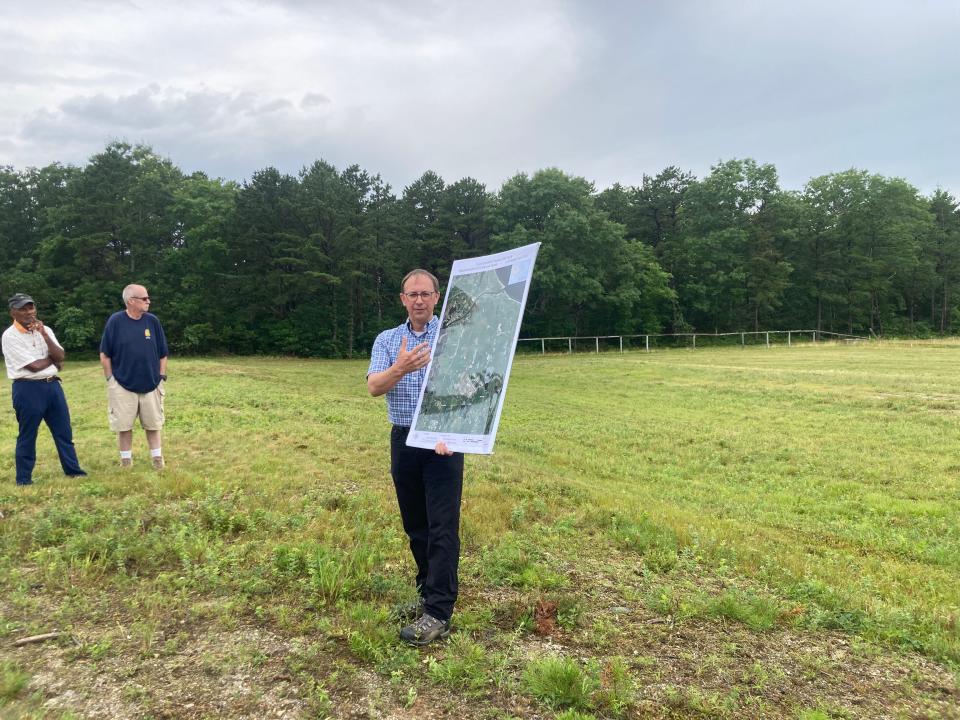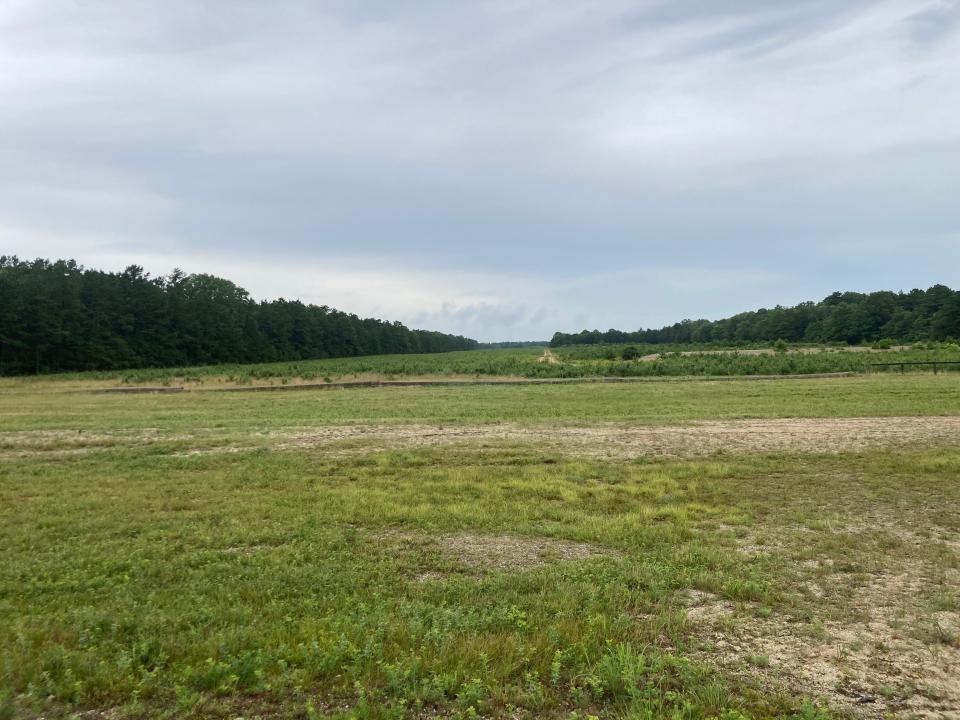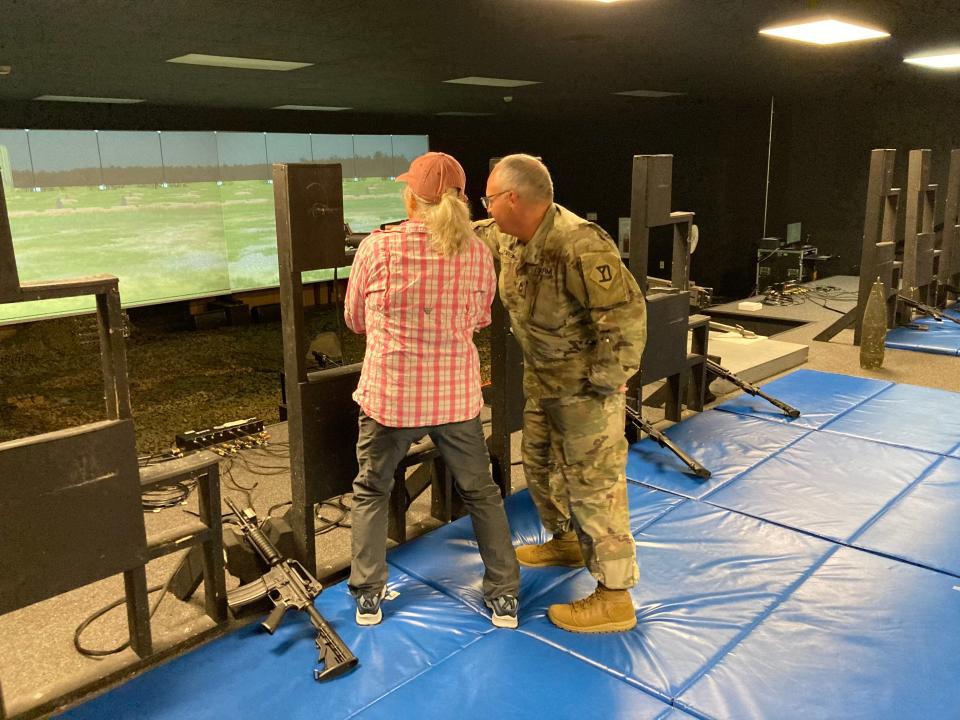With new lease, Massachusetts Army National Guard ensured ability to plan, build and train
Editor's note: This story was updated on July 21, 2023, to correct the figures for the overall direct, indirect, and induced economic activities generated by daily Joint Base Cape Cod operations, and to correct an attribution.
CAMP EDWARDS — Massachusetts Army National Guard has secured its use of Camp Edwards through the end of the century, following a lease extension signed by then-Gov. Charlie Baker in October.
The lease extension of 15,000 acres on the Upper Cape has given the Army National Guard the longevity it needs to compete for future military construction funding, according to Army National Guard spokesperson Don Veitch.
But, according to the Association to Preserve Cape Cod, the signing of the lease extension lacked transparency and public comment about use of the land.
Rethinking the use of Joint Base Cape Cod "provides a generational opportunity to solve some of the Cape's most difficult economic and environmental challenges," wrote Andrew Gottlieb, the association's executive director, in a July 9 opinion column in the Times. Among those challenges are protecting the Cape's drinking water and providing more affordable housing, Gottlieb wrote.
The lease extension comes as the Massachusetts Army National Guard works toward building a machine gun range at Camp Edwards to train its soldiers. On June 22 the Army National Guard issued a request for proposals for a multi-purpose machine gun range estimated at $8.9 million, according to the release notice. The final bids were due July 17.

The machine gun range is needed because the Guard soldiers need to comply with updated U.S. Army qualification standards, including no more paper targets, Veitch said. The machine gun range is also needed, he said, because there is no other place in the state that prioritizes Army National Guard training.
At the same time, the Guard's movement ahead on the machine gun range has been seen as a potential threat to the Cape’s aquifer by environmental advocates including Gottlieb and by a U.S. Environmental Protection Agency draft determination released in April. The EPA held a period of public comment for 60 days from the time of its April draft determination through June 26.
What is Joint Base Cape Cod?
Joint Base Cape Cod sits on land owned by the Commonwealth of Massachusetts and covers nearly 22,000 acres, or about 30 square miles, and comprises five military commands, bases, and stations including the U.S. Army, the U.S. Air Force and the U.S. Coast Guard.

The National Guard, a U.S. Army installation, is housed at Camp Edwards, in the northern area of the base, and is described by the Guard as the region's largest training area.
The 15,000 acres is the largest piece of undeveloped land on Cape Cod and home to 37 state-listed species, in addition to sitting atop an aquifer that supplies drinking water to Upper Cape Cod communities, according to the materials on the Joint Base Cape Cod website.
The base is part of the towns of Bourne, Sandwich and Mashpee, and it abuts the town of Falmouth.
Here's the history of the Camp Edwards lease
The lease has been amended three times to date, according to the lease renewal titled Supplemental Agreement No. 3 To Lease No. DACA51-5-77-127 Camp Edwards Army National Guard, Joint Base Cape Cod, Barnstable County, Massachusetts, reviewed by the Times.
In agreements dating from July 1, 1976, and Oct. 4, 2001, the state leased land to the U.S. Army through 2026, roughly 50 years, agreeing the U.S. Army would maintain the leased land and manage the northern 15,000 acres to protect drinking water and wildlife habitat.
In an agreement on Sept. 24, 2003, the lease was extended through 2051, about 48 years. And in October 2022, with Baker's signature, another agreement extended the lease through 2099.
Generally, land is leased by the commonwealth to the Departments of the Army and Air Force, which in turn, license the land back to the Massachusetts Army National Guard and Massachusetts Air National Guard for military training, according to the lease.
Why does the Massachusetts Army National Guard need an extended lease?
In order to remain competitive for funding initiatives like mission planning, infrastructure upgrades, and equipment, the Massachusetts Army National Guard is essentially required to own property. Military funding requests require there to be 25 years remaining on leased property, according to Veitch.
If the National Guard were to compete with another organization in a different state for funding, and that organization had a longer lease on their land, the funding would have a higher chance of being awarded to the organization with the longer lease, according to meeting minutes from a May, 18, 2022 Joint Base Cape Cod Military-Civilian Community Council meeting.
The intention to pursue the extension of leases to 2099 for Massachusetts National Guard properties including Camp Edwards for the Army National Guard, and also for Otis Air National Guard Base for the Air National Guard, was made public at that 2022 meeting, according to the minutes. Joint Base Cape Cod Executive Director Brigadier General Christopher Faux made the announcement, according to the minutes.
What is the complaint from Association To Preserve Cape Cod?
The planned extension of the lease was not brought to the public "in any meaningful fashion," Gottlieb said in early July in a phone interview.
"My concern is that nobody knew about it," Gottlieb said, in reference to the May 2022 Military-Civilian Community Council meeting.
The council, known as the MC3, meets quarterly or as needed to discuss projects and policies that affect the southern 5,000 acres, or cantonment — military quarters — area, of the base, according to the base website.
The council has representatives from Falmouth, Bourne, Sandwich, and Mashpee; a family member resident of the base; two military representatives; one representative of the Cape Cod Commission; one representative of the Upper Cape Regional Water Supply Cooperative; one representative of the Wampanoag Tribe; and five other members, according to the Oct. 1, 2001, memorandum of agreement between the state, the U.S. Army and the National Guard Bureau.
The Association To Preserve Cape Cod is also a member, according to the Massachusetts National Guard.
"The lease extension for Camp Edwards and Otis was an agenda item at the MCCC public meeting in May 2022,” Veitch said in the email. “The lease was not modified outside of extending the dates of the previous lease.”

Twelve council members attended the May 18, 2022, meeting, according to the minutes, and eight others including two people listed as community members.
Gottlieb, who did not attend the meeting, said there was no particular negative response when the lease extension was brought up. "My response to that would be, it was a very lightly attended meeting, it was last May, and that was it — that was it,” Gottlieb said
What is the drinking water threat on Cape Cod?
Cape Cod has one of the most productive groundwater systems in New England, but that also means water supplies are susceptible to contamination from development and land uses within their watersheds, according to the Cape Cod Commission. The aquifer is solely recharged by precipitation.
Nitrogen is one threat. The saltwater border that has defined the Cape Cod peninsula is being poisoned by nitrogen, according to the 208 Plan of the Cape Cod Area Wide Water Quality Management Plan Update, approved by the Environmental Protection Agency in 2015. "The rapid decrease in the water quality of Cape Cod’s marine ecosystems is plain to see," according to the plan. "The problem is nitrogen and the largest controllable source is the septic systems used every day."
PFAS is also a threat, according to Barnstable County officials. On Cape Cod PFAS contamination comes from multiple sources — fire training areas, airports, military bases, landfills, municipal wastewater biosolids, and private septic systems. PFAS has also been found in multiple locations on Joint Base Cape Cod, with a fire training area used between 1958 and 1985 being the most significant source of PFAS due to the heavy use of the aqueous film-forming foams used to douse fires.
Could portions of the base be put to different uses other than military, such as housing?
Alisa Magnotta, chief executive officer for the Housing Assistance Corporation, said there are housing developments and apartment-style complexes on the base already. She said some units have since fallen into disuse and disrepair.
“I’ve been on the base multiple times,” Magnotta said. “The buildings are falling apart, they're not even doing a good job keeping them up. And that's shameful. That's taxpayer dollars. It's wasteful.”
One of Gov. Maura Healey’s early campaign goals promised to repurpose state-owned land to be used for housing. In June, the state sold a 1.4-acre lot and a former orphanage in New Bedford to a private developer to build 28 apartments.
Magnotta said the state should take similar measures at Joint Base Cape Cod. The housing stock on the base consists of some single-family houses, but Magnotta said the majority are dormitory and apartment-style units.
“We should be looking to places that are already developed,” she said. “That's really one of the main reasons why we're leaning in towards wanting to have the base, or a portion of the base, allocated to housing.”
The base is part of the community, according to town officials and the Massachusetts National Guard
Around 4,800 military and civilian individuals work on the base across all commands, according to Veitch. Residents of the base consist of U.S. Coast Guard and Cape Cod Space Force Station individuals, he said.
According to figures analyzed from the Donahue Institute at the University of Massachusetts, the overall direct, indirect, and induced economic activities generated by daily Joint Base Cape Cod operations exceeded $611.7 million in 2019. In 2011, that figure was $405.7 million, according to the Army National Guard.
Many residents of Sandwich work on the base in either a military or civilian capacity, according to Sandwich Town Manager George "Bud" Dunham. The base is really important to the town's economy, Dunham said.
"I try to spend a lot of time making sure I know the people over there so when we have questions or issues, we know who to call," Dunham said.
Peter Meier, a Bourne Select Board member, said around a hundred registered voters from the base vote in local Bourne elections.
"I've been trying to get Joint Base Cape Cod more involved in the community, to know that they are a part of the fabric and they're welcomed to be involved in anything," Meier said.
John Cotton, chair of the Mashpee Select Board and a representative of the MC3, said having a relationship with the base is "critical" because they are just like another town on the Upper Cape.
"The MC3 does a good effort to try and communicate all these different command infrastructures and they try to put it through one conduit," Cotton said of the military commands operating at Joint Base Cape Cod. "There's always critique going around, but you could criticize anything, and I think they're doing the best they can."
Walker Armstrong reports on all things transportation and the Joint Base Cape Cod military base. Contact him at WArmstrong@gannett.com. Follow him on Twitter: @jd__walker.
Thanks to our subscribers, who help make this coverage possible. If you are not a subscriber, please consider supporting quality local journalism with a Cape Cod Times subscription. Here are our subscription plans.
This article originally appeared on Cape Cod Times: Army National Guard lease through 2099 secured land for military use

